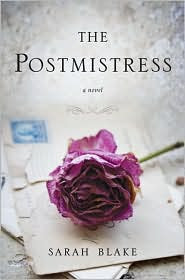REVIEW: The Postmistress by Sarah Blake
 Synopsis
SynopsisThose who carry the truth sometimes bear a terrible burden...
Filled with stunning parallels to today's world, The Postmistress is a sweeping novel about the loss of innocence of two extraordinary women-and of two countries torn apart by war.
On the eve of the United States's entrance into World War II in 1940, Iris James, the postmistress of Franklin, a small town on Cape Cod, does the unthinkable: She doesn't deliver a letter.
In London, American radio gal Frankie Bard is working with Edward R. Murrow, reporting on the Blitz. One night in a bomb shelter, she meets a doctor from Cape Cod with a letter in his pocket, a letter Frankie vows to deliver when she returns from Germany and France, where she is to record the stories of war refugees desperately trying to escape.
The residents of Franklin think the war can't touch them- but as Frankie's radio broadcasts air, some know that the war is indeed coming. And when Frankie arrives at their doorstep, the two stories collide in a way no one could have foreseen.
The Postmistress is an unforgettable tale of the secrets we must bear, or bury. It is about what happens to love during war-time, when those we cherish leave. And how every story-of love or war-is about looking left when we should have been looking right.
About the Author
Born in New York City, Sarah Blake has a BA from Yale University and a PhD in English and American Literature from New York University. She is the author of a chapbook of poems, Full Turn (Pennywhistle Press, 1989); an artist book, Runaway Girls \ (Hand Made Press, 1997) in collaboration with the artist, Robin Kahn; and two novels. Her first novel, Grange House, (Picador, 2000) was named a "New and Noteworthy" paperback in August, 2001 by The New York Times. Her second novel, The Postmistress, was by Amy Einhorn Books/Putnam in February 2010. Her essays and reviews have appeared in Good Housekeeping, US News and World Reports, The Chicago Tribune and elsewhere.
Sarah taught high school and college English for many years in Colorado and New York. She has taught fiction workshops at the Fine Arts Works Center in Provincetown, MA, The Writer's Center in Bethesda, MD, the University of Maryland, and George Washington University. She lives in Washington, DC.
My Thoughts
I had a really hard time getting into this book, and in the beginning I almost gave it up. But I told myself to give it 100 pages. If I didn't "feel it" by then, I would abandon it. The writing style in beginning of the book was so manic and clipped that I had a hard time following it. It didn't "flow" for me. I have to assume that this was intentional, displaying the mania of the war and the brevity of life. I felt no connection to the characters. I couldn't even keep the characters straight, and didn't know who was who.But around chapter four things shifted, and became more enjoyable for me. I got a handle on who I was dealing with in the story, and the dialogue flowed.
The time is 1940, and on the other side of the world a war is engaged. When the book starts out, America is relatively unaffected by the war. We see the idyllic life of a young girl Emma, freshly married and moving to be with her new husband Will in a quiet northeastern coastal town. Will is the town doctor, and he and Emma are young, naive and in love, but Will has his own ghosts to deal with.
At the same time we are introduced to the Postmistress Iris. Actually we are introduced to Iris in the opening chapters of the book before anyone else in a very odd way, but I don't want to ruin it for anyone by disclosing how we are introduced to her.
But I will say that Iris seemed symbolic to me of the US at this time-- intact and untouched. Likewise Will and Emma sort of start out this way, young and in love and warm and cozy in their little cocoon. But then the cruelties of life begin to creep in and the cocoon begins to unravel.
We are also introduced to Frankie Bard- a reporter covering the story in Europe. Tough and somewhat "untouchable" in the beginning, she softens as the story goes on, becoming much more vulnerable.
It's funny. The first 50 pages were my least favorite of the book, and the last 50 were my most enjoyable.
This book was "okay". It just wasn't consistent for me. I'd like it, then it would drag, then I'd like it, and then it'd drag. I'd connect with moments, but for the most part I felt somewhat detached from the story. It just never really did "grab" me.
However the more things change, the more that they remain the same. There is an area of the book that mentions British and Russian forces invading Iran to protect the oil supply:
Worried by reports of German "tourists", Britain and Russia today decided that Iran must accept their protection of oil supplies. British land forces advanced in two areas to secure oil near Abadan and northeast of Baghdad to take similar sites around Kermashah.This was in 1940. Sound familiar? Sound like something you'd hear on the nightly news today?
Not a bad story, but my least favorite so far of the three First Look books that I've read.
The Postmistress is available for sale on February 9, 2010.
My Rating: 7 out of 10

